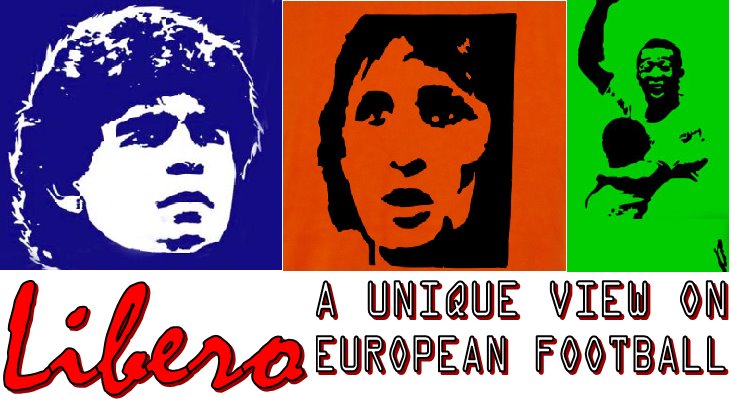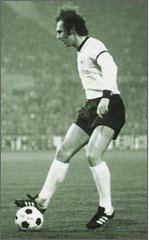Germany vs. Spain
Everything has to come to an end. Tonight, one of the most thrilling tournaments in football history will end, hopefully in the most enticing, dramatic fashion. There was an Arsenal presence on either side, with Cesc Fabregas supporting Torres in attack against his soon-to-be ex-team-mate Jens Lehmann, who will join Stuttgart on July 1st. Both must have been hoping for their first piece of silverware since the 2005 FA Cup.
Germany disposed of their fellow favourites Portugal with a pressing game and their use of the aerial ball and set pieces, with Klose and Ballack netting with headers. Joachim Low’s side also gave a reminder of their technical ability in Schweinsteiger’s opening goal, showing they have that intriguing quality, we English call ‘grit’ and the necessary technical ability. Moreover Michael Ballack was declared fit to start, a player who has been lavished with praise this summer, averaging 12 miles a game. The German captain is deceptive with his movement on the pitch, especially when viewing the game on television. One hopes he can complete the 90 minutes on a stage with is fitting of his talents, having been suspended for the 2002 World Cup final.
For their efficient style of play, with the needed ball always played accurately and always finished with aplomb, their defensive play has little to be admired, with the fear that Mertesacker and Metzelder likely to troubled by the pace and industry of Torres always in the back of the German mind. Or will they? The psychology of major games is a huge factor, with the white shirts so successful in major tournaments, last triumphing in 1996 thanks to Oliver Bierhoff, now the team manager of the national side. Despite their lack of progress in Euro 2000 and 2004, it is a testament, partly to their history and predominantly their qualifying campaign and their 2006 showing, as to their pre-tournament backing. Spain, who last reached a final in Euro 1984 and lost 2-0 against Platini’s france, and last triumphed in 1964, in a side inspired by Luis Suarez, may have felt under greater pressure to make history.
Against them, the Spanish side were shorn of David Villa, the current top scorer with 4 goals, but Fabregas was brought in to influence the attacking play alongside Catalan duo Xavi and Iniesta. The size of the Spanish team was a concern despite their technique, as Xavi claimed of his fellow midfielders: ‘Passing is in our DNA’, with the short midfield of Portugal overcome by the Germans in a physical contest. Spain have a much more varied approach to their neighbours and this intriguing contest between two differing styles appeared to make for a fitting end to this enthralling three weeks.
Real Madrid’s Sergio Ramos has often been compared to the legendary Paolo Maldini but this comparison looks false especially on the basis of his positional play throughout the tournament and his defensive assurance with a poor back-pass to Puyol intercepted by Klose, who overran the ball as he raced into the box. The Germans had more of the ball and pressed hard as they made the more impressive start, with Ballack beating Puyol to the ball and flashing a cross in, which reached no-one. But for all their industry it was Spain, who created the first chance, as Xavi cut open the German defence with a slide-rule pass inside Friedrich, who was beaten by Iniesta as he cut in. The Barcelona playmaker drove the ball into the box and it almost hit the net, deflecting off Metzelder. Lehmann, who has been criticised for error-prone displays throughout the tournament, proved that age is no barrier, with a stunning reaction save to keep the score at 0-0. Aragones’ side grew into the match, using the running of Torres down the channels to create space in the German defence allowing time for the midfield runners to support him in attack. Sergio Ramos crossed at the far post over the head of the giant Mertesacker for Torres, who headed against the post with Lehmann beaten. Fortunately for Low’s side, the rebound evaded any red shirts. Germany countered as Ballack’s effort was blocked in the box by Ramos. Torres made runs from early passes as Spain looked to bypass the German midfield, but on both occasions he was denied by well-timed sliding challenges from Mertesacker.
The Liverpool man, overshadowed by the clinical nature of David Villa, continued to torment the German defence, as he ran onto a fine pass from the ‘quarter-back’ Xavi, and outmuscled Lahm to finish with aplomb over Lehmann’s dive as the net rippled. The Red half of the Ernst Happel Stadium shook the stands with a flare going off and covering a part of the stadium in a mist. They would have been rejoicing once more, as Iniesta clipped a cross to Silva at the far post, but he sliced his volleyed effort high and wide. Germany had a few set-pieces, which we unsuccessful as they attempted to equalize, but the aerial threat of Ballack was not present as he had to be attended to after a cut by his eye. Spain closed down any German attack and countered in numbers with Xavi playing in Iniesta on the left flank, but he could not find the space to cut the ball back to Torres.
The second half began with Marcel Jansen, disappointing in his defensive game in the group stages, but adventurous in supporting the attack, replacing Lahm as Low attempted to perhaps pin back Sergio Ramos, who was supporting the Spanish attack. A Spanish corner reached David Silva at the far post. The Valencia wideman had time to control and shoot and his shot was almost turned in by Ramos. Spain almost doubled their lead with a move involving the same players as Xavi played in Torres once more, but this time Lehmann gathered. Soon after, the Real Madrid full-back stormed forward and lashed in a cross across the goal, but it was Germany who began to take the initiative. Jansen passed to Schweinsteiger in the centre, who laid the ball off for Ballack to shoot into the side netting.
Aragones, in his last game as Spainish coach, showed once more that he was not afraid to take off the big players, as he has done with Torres in the past few games. He replaced Fabregas and Silva with Alonso and Cazorla respectively. Ramos then had a header tipped over by Lehmann at the back post, after horrible defending by Jansen playing on his fellow full-back. Iniesta had a chance from the resulting corner and after it was played short, he hammered a shot to the near post. A combination of Frings on the line and Lehmann denied the Barcelona man, who had another chance soon after. Cazorla fed the tricky attacker but his shot was straight at Lehmann and lacked pace.
Frings then curled a free-kick into the box, but Casillas punched well clearing any danger. The Real Madrid keeper was assured at any high ball, clearing any set-piece or cross with ease, showing why he is rated the best in the world. Xavi released Torres once more, who knocked the ball past Mertesacker, but overhit his touch, allowing Lehmann to gather in what was becoming a typical move for the Spanish. They continued their dominance as Xabi Alonso made a first time volleyed pass to his club team-mate Torres from a lofted ball but the striker couldn’t reach. Low brought on Gomez for Klose in his final throw of the dice but the Stuttgart attacker barely had a touch of the ball. Santi Cazorla of Villarreal crossed to the far post where Guiza stood. The 27-goal Mallorca man headed back across to Marcos Senna, who was inches away from connecting and making it 2-0. Xavi was involved in a late move, but rather than shoot the last man elected to play in Xabi Alonso, who couldn’t reach the ball. The four minutes of stoppage time ended as Roberto Rosetti blew for the final whistle in a score-line that didn’t reflect the Spanish dominance. Iker Casillas held aloft the Henri Delauney trophy as the fireworks began and the champagne rolled.
It was fitting that a side that adopted an attacking philosophy came out victorious in a tournament that promoted attacking football that was aesthetically pleasing. The goals to games ratio increased from 2.30 in the 2006 World Cup to 2.53 in Euro 2008 showing a clear indication of the forward-minded mature of the majority of the 16 sides that began the tournament on June 7th. The organisation by the host nations Austria and Switzerland was exceptional and only added to the viewing experience of the tournament. They last won this tournament 44 years ago, but that elusive World Cup still awaits their talents. We should offer commiserations to Michael Ballack, after an agonizing season, in which he lost three trophies, similar to the 2001/02 season, in which his side was beaten on three fronts, while Germany lost against Brazil in the final. An exceptional player, if not one of the most unlucky.
Aragones celebrates his 70th birthday with this deserved triumph, having been heavily criticised for his decisions throughout his four year reign, such as dropping Real Madrid talisman Raul, but now he is likely to be afforded the freedom of the country after ending so many years of hurt and under-achievement. Finally, our own Cesc, ending his club season on a low, should be very optimistic and on a mental high note come the new season. The Arsenal maestro gave an eloquent interview to the BBC revealing his joy and acknowledgement to their success and its place in Spanish history. In two years time, one is likely to bet the media will compare England’s hopes in South Africa to Spain in 2008, with it being 44 years in 2010 since the 1966 triumph.
A final word goes out to John Motson, who bowed out from live commentary on the BBC, after a long and illustrious career beginning in modest radio roots and ending on the biggest stage. But it was Spain’s day and Spain’s summer. Sport is by no means short in summer 2008, with the Olympics soon to begin and Wimbledon underway.
Germany 0 – 1 Spain
Friday, 11 July 2008
Subscribe to:
Post Comments (Atom)



No comments:
Post a Comment